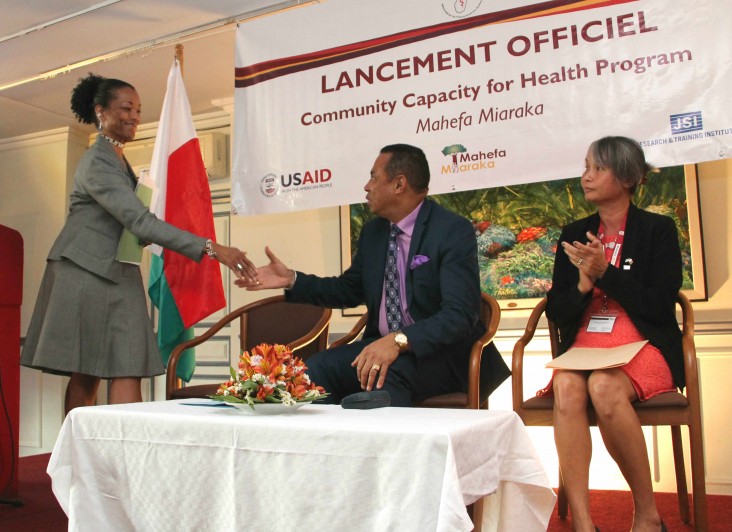
For Immediate Release
Antananarivo - 6.1 million people, 23.3% of the total population of Madagascar (INSTAT, 2015), will benefit from a new 5-year, $30 million USD integrated community health program funded by the United States Agency for International Development (USAID). The program is a collaboration between the Minstry of Public Health, USAID and JSI Research & Training Institute, Inc. (JSI).
The Community Capacity for Health (CCH) program, which will be known locally as Mahefa Miaraka, is a follow-on of a previous, highly successful 5-year program called MAHEFA, which helped over 3.5 million people access health care through community health volunteers, treated more than 620,000 children for serious illnesses and built over 86,000 latrines. MAHEFA also trained and equipped 6,052 community health volunteers, who are an essential part of Madagascar’s health care system, providing underserved and remote communities with access to health services, education on healthy behaviors and delivering life saving medicines. The Mahefa Miaraka program builds on this success and will continue to promote the community health approach.
Program Context and Objectives
The CCH program is fully aligned with the priorities identified by the Madagascar government and the Ministry of Public Health as stated in the National Health Sector Development Plan. The program will be implemented by John Snow Inc. Research & Training Institute, Inc. (JSI), in partnership with Family Health International 360, Transaid and the Action Socio-sanitaire Organization Secours (ASOS) of Madagascar, and in close collaboration with the Ministry of Public Health. The program will contribute to the implementation of the government of Madagascar’s National Health Sector Development Plan and the Campaign for Accelerated Reduction of Maternal Mortality in Africa (CARMMA) Roadmap, an African Union initiative to reduce maternal, neonatal and infant mortality and morbidity.
“The success of this project is only possible due to the excellent partnership between the Madagascar government, USAID, JSI, the community volunteers we support and the residents of the communities we serve,” said USAID Mission Director, Michelle Godette. “As the name Mahefa Miaraka symbolizes, Together We Are Capable, and together we are stronger and can achieve our goals.”
The program aims to strengthen the capacity of the public sector to plan, provide, and manage community health services, and reinvigorate community engagement in health. The project will contribute improved health services in 5,205 fokontany, 447 communes and 34 districts in the regions of Analanjirofo, Sava, Diana, Sofia, Boeny, Melaky and Menabe. The program will work closely with 448 primary health care centers, and 9,800 community health volunteers will be trained, equipped, and supervised to provide basic health services in the areas of maternal, neonatal, and infant health, and family planning and reproductive health. The program will also work in the areas of prevention of sexually transmitted infections; promotion of water, sanitation and hygiene; improved nutrition, and malaria prevention.







Comment
Make a general inquiry or suggest an improvement.